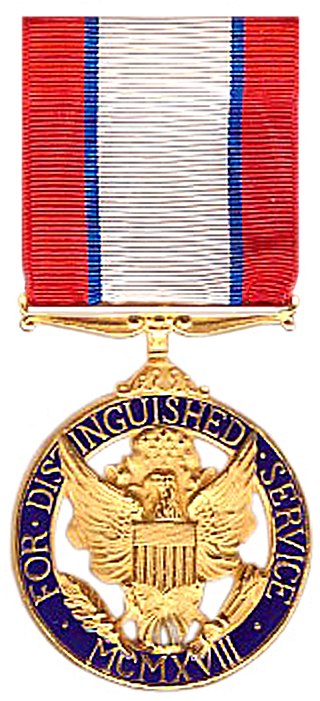
The Distinguished Service Medal (DSM) is a military decoration of the United States Army that is presented to soldiers who have distinguished themselves by exceptionally meritorious service to the government in a duty of great responsibility. The performance must be such as to merit recognition for service that is clearly exceptional. The exceptional performance of normal duty will not alone justify an award of this decoration.

The Distinguished Flying Cross (DFC) is a military decoration of the United States Armed Forces. The medal was established on July 2, 1926, and is currently awarded to any persons who, after April 6, 1917, distinguish themselves by single acts of heroism or extraordinary achievement while participating in aerial flight. Both heroism and extraordinary achievement are entirely distinctive, involving operations that are not routine. The medal may be awarded to friendly foreign military members in ranks equivalent to U.S. Pay Grade of O-6 and below, in combat in support operations.

Maxwell Davenport Taylor was a senior United States Army officer and diplomat of the mid-20th century. He served with distinction in World War II, most notably as commander of the 101st Airborne Division, nicknamed "The Screaming Eagles."
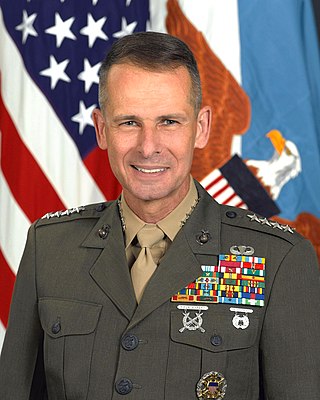
Peter Pace is a retired United States Marine Corps general who served as the 16th chairman of the Joint Chiefs of Staff. Pace was the first Marine officer appointed as chairman and the first Marine officer to be appointed to three different four-star assignments; the others were as the sixth vice chairman of the Joint Chiefs of Staff from October 1, 2001, to August 12, 2005, and as Commander-in-Chief, U.S. Southern Command from September 8, 2000, to September 30, 2001. Appointed chairman by President George W. Bush, Pace succeeded U.S. Air Force General Richard Myers on September 30, 2005.

John William "Jack" Vessey Jr. was a career officer in the United States Army. He attained the rank of general, and was most notable for his service as the tenth chairman of the Joint Chiefs of Staff.

Harold Keith "Johnny" Johnson was a United States Army general who served as Chief of Staff of the United States Army from 1964 to 1968. Regarded as a premier tactician, Johnson became skeptical that the level of resources given to the Vietnam War, much of which went into 'find, fix, and destroy the big main force units' operations, could deliver victory. Johnson came to believe that the Communist forces held a trump card, because they controlled whether there were engagements with U.S. forces, giving an option to simply avoid battle with U.S. forces if the situation warranted it.

Earle Gilmore Wheeler, nicknamed Bus, was a United States Army general who served as the chief of Staff of the United States Army from 1962 to 1964 and then as the sixth chairman of the Joint Chiefs of Staff (1964–1970), holding the latter position during the Vietnam War.
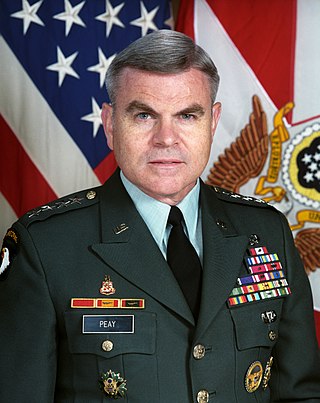
James Henry Binford "Binnie" Peay III is a retired four-star general of the United States Army. He served as the 14th superintendent of the Virginia Military Institute from 2003-2020, and as chairman of the Allied Defense Group from 2001-03. He has also served on various corporate and nonprofit boards.
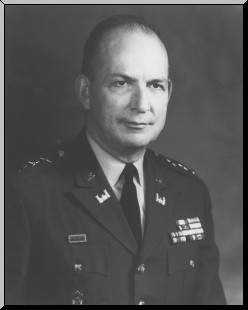
Frederick James Clarke was a civil and military engineer with the United States Army Corps of Engineers. Clarke was one of three commissioners appointed to run the District of Columbia from 1960 to 1963. He rose to the rank of lieutenant General as the Chief of Engineers.
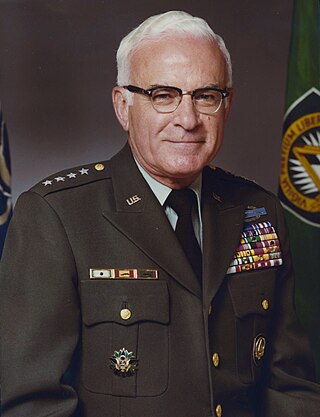
Bernard William Rogers was a United States Army general who served as the 28th Chief of Staff of the United States Army, and later as NATO's Supreme Allied Commander, Europe and Commander in Chief, United States European Command.

Earl Edward Anderson was a U.S. Marine four-star general. He was the youngest active duty Marine ever promoted to the rank of general and the first active duty Marine Naval Aviator to be promoted to a 4-star rank. He became Assistant Commandant of the Marine Corps on April 1, 1972. He was promoted to general on March 31, 1972. General Keith B. McCutcheon had been promoted to four-star rank the day of his retirement for medical reasons on July 1, 1971. During his 35-year Marine career, he served in combat actions in World War II, the Korean War, and the Vietnam War.
Lê Nguyên Khang was a South Vietnamese lieutenant general who commanded the South Vietnamese Marine Division.
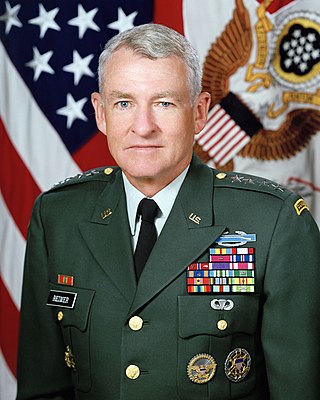
Dennis Joe Reimer is a retired general of the United States Army, who served as the 33rd Chief of Staff of the Army from June 20, 1995, to June 21, 1999. He is also a graduate of Ranger and Airborne school.
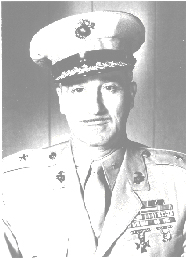
Brigadier General Frederick Joseph Karch was United States Marine Corps officer who served during World War II and the Vietnam War, particularly notable in the latter for leading the Marine Corps onto Nam O Beach at the beginning of large-scale US involvement in Vietnam.
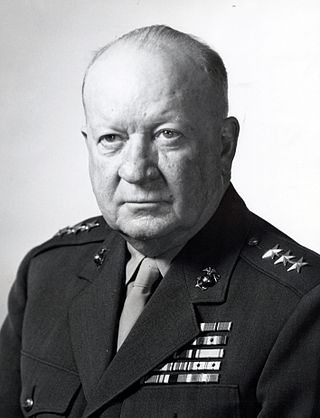
General Ray Albert Robinson was a United States Marine Corps general who served in the Corps more than 40 years. His long and colorful career included service in France during the First World War, action at Guam and Iwo Jima in World War II, sea duty, and China service between World Wars. He also served in 1929 as officer in charge of the Marine detachment which built President Herbert Hoover's Rapidan Camp mountain retreat near Criglersville, Virginia. Robinson twice earned the Legion of Merit with Combat "V" during World War II — the first for outstanding service in July and August 1944, as chief of staff of the 3d Marine Division during the planning and execution of the recapture of Guam; and the second for outstanding service from October 1944 to March 1945, as chief of staff of the 5th Marine Division during the preparation and combat phases of the Iwo Jima campaign.

Howard Dwayne Graves was a United States Army officer who served as the superintendent of the U.S. Military Academy from 1991 to 1996, and as the chancellor of the Texas A&M University System from 1999 to 2003. A 1961 graduate of West Point, he was a Rhodes Scholar, earning three degrees from Oxford during his army career. During his service in the Army, he was the personal aide to two Chairman of the Joint Chiefs of Staff; Admiral William J. Crowe and General Colin L. Powell.

Bruno Arthur Hochmuth was a United States Marine Corps major general who was killed in South Vietnam during the Vietnam War. He was the first and only Marine Corps division commander to be killed in any war. He was also the first American general officer to be killed in Vietnam, although U.S. Air Force Major General William Crumm had been killed on July 24, 1967, in a B-52 bomber collision over the South China Sea. Hochmuth, four other marines, and a South Vietnamese Army aide were killed when a UH-1E Huey helicopter they were riding in from VMO-3 exploded and crashed five miles northwest of Huế.

Charles Rankin Bond, Jr. was an American pilot and United States Air Force officer. He served with the Flying Tigers in Burma and China during World War II. He was shot down twice and was credited with shooting down 9.5 Japanese airplanes. He later served in the Soviet Union as an aide and personal pilot to W. Averell Harriman. He rose to the rank of Major General and, during the Vietnam War, he was the deputy commanding officer of the 2d Air Division in Vietnam and the 13th Air Force in the Philippines. He retired from the United States Air Force in 1968 as commander of the Twelfth Air Force. In 1984, Bond's diary of his service with the Flying Tigers was published and became a bestseller.

Arthur Eugene "Gene" Dewey was United States Assistant Secretary of State for Population, Refugees, and Migration from 2002 to 2005.


















